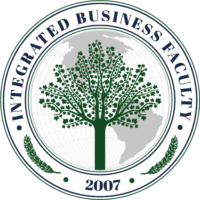Integrated business curriculum
19 July 2023 2023-09-30 13:52Integrated business curriculum
The curriculum of the Integrated Business Faculty (IBF) is modeled after the Integrated Business Curriculum (IBC), a course taught at the University of Idaho. Idaho – UI ), USA. This unique undergraduate study, designed and developed in the USA over the past fifteen years, received an award in 2003 for its innovative and creative approach to business education.oh [i] .
There are four main features that make IBC so innovative:
1. The basic areas of functioning within a firm (for example finance, marketing, management, human resource management, production and operational systems management, business informatization, etc.) are taught in a way that emphasizes their interactive influence on each other and on the overall performance of the firm and its ability to succeed. Of course, bearing in mind that the environment in which companies operate is even more complex and exposed to globalization processes and trends, which is also illustrated in the following picture:


- Throughout the course, students work in teams in order to learn and practice teamwork skills, which in today’s conditions are becoming more and more crucial for the survival of companies. In this way, they understand how various functional areas can work better, but also how they can achieve synergistic positive and/or negative effects, influencing each other. The following picture shows an example of the structure of issues at the managerial level that every businessman faces:
This is the model of holistic analysis taught to students in the IBC program. The FBE graduate student, after successfully completing his studies and completed higher (undergraduate) education, will have all the economic knowledge of the chosen field (financial management, marketing management, banking, regional and local business development and sustainable development – environmental economics), but will is also distinguished by knowledge and competence from other operational aspects of running a business, as well as “development of instincts” for the ethical use of all means necessary to face business problems. The businessman, who must “do everything” when starting new investments, must be well prepared after completing his studies in business economics.
- The teaching is held by a team of professors from the faculty, who de facto represent the various functional areas within a company. At the same time, students practice the acquired knowledge and skills in a real environment of the market and the institutional system, running their own virtual small business.
- The course lasts two semesters, i.e. one academic year. In the study process, students’ competence is tested individually and for each subject in the individual field. At the same time, the lectures on the specific topics are illustrated through an analysis of the existing problems in the Macedonian economy and case studies of selected individual businesses, so that they would best reflect the challenges and opportunities faced by Macedonian businessmen, seen and solved through the eyes of the students. thus our students, sublimating knowledge from multiple disciplines, learn to discover complete solutions, in the same way as an owner/manager of an enterprise would do. Following this approach to work, FBE provides the best form of education adapted to today’s needs of the Macedonian economy.
The business and the curriculum
American business education in the past 25 years, starting from focusing mainly on large corporations, has expanded to include education that is appropriate to the needs of establishing and operating small and medium-sized enterprises. In a highly developed economy such as the American one, over 95% of enterprises are defined as “small” and create over 85% of new jobs in the country. Over 70% of these jobs result from new entrepreneurial businesses whose primary goal is profitability, growth, risk-taking and innovative strategic practices.
In developing countries, employment in small enterprises results in an even greater number of jobs, so for example, just for illustration, in Macedonia 98.7% of all registered enterprises are small and medium and they absorb 79% of the available workforce in the country. Therefore, for an economy such as Macedonia’s, creating a curriculum relevant to small enterprises and business is vital. Entrepreneurs who start a business with these basic goals must keep in mind all strategic and operational decisions of the firm. A businessman must be competent in all work areas and must see his firm and the competitive environment as a connected process or system. Every businessperson must also be able to assess risk at both an operational and a strategic level. The FBE curriculum brings all other courses to the business level by creating a culture of building business from multiple perspectives and assessing the risks arising from business and/or strategic decisions.
The basic concept for integrated business education, during its application since the establishment of the “Faculty of Business Economics” in 2006, was further developed and upgraded with the implementation of the same approach of interactivity in all teaching disciplines. Namely, in addition to the integrated business modules (IBC-1 and IBC-2)[ii], in the teaching activities for each subject, interactive teaching is foreseen through various research activities of the students in the field, for the corresponding thematic areas grouped in 3-4 complex topics, during each semester. Thus, team learning from the fields of finance, management, marketing, information systems, international business, quantitative analysis, economics and accounting, etc. is achieved through mastering the basic methodology of research in the field and in all available media (internet, periodicals, literature, etc.).
Such an approach allows us to emphasize teamwork, practical understanding and experience of business systems, production planning and various processes in business, decision making, management of company resources and decisions on business functioning, etc., equipping students for practical application of the theoretical knowledge they acquire during their studies.
In addition to the interactive approach during teaching, FBE also organizes a one-month summer internship for its students in various enterprises (in banks, in the IT, pharmaceutical and steel industries, in the non-governmental sector, state administration and local self-government, etc.).
After all, the very fact that 80% of our graduates are employed speaks volumes about the uniqueness of the selected integrated approach that we apply in business education and its superiority in relation to the so-called “Classical” study of economics at other universities in the country and the region.
[i] MOSCOW – UI’s College of Business and Economics, with 1,300 students, 40 full-time faculty, small cohorts, new high-tech facilities, and innovative curriculum, received the Award for Innovative and Creative Education from the International Academy for Educational Leadership in 2003 year. The prize was awarded within the framework of the annual international meeting of the Associated Academies.
[ii] A more detailed description of the IBC-1 and IBC-2 modules can be found in the Integrated Approach section

